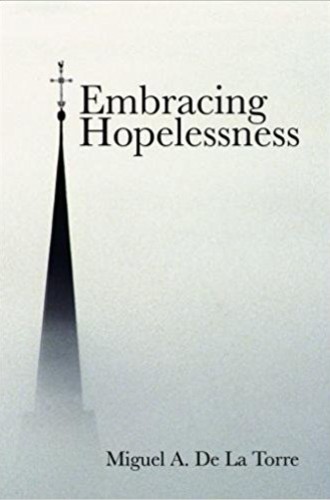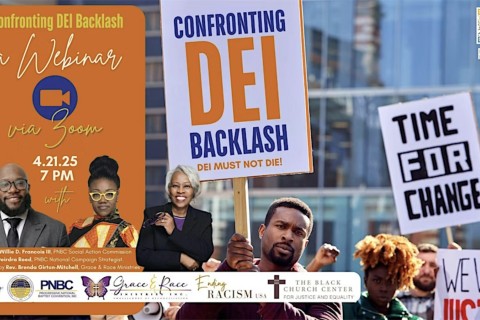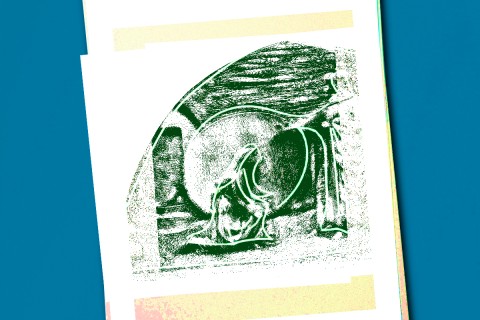Miguel De La Torre’s ethic of hopelessness
De La Torre has little use for hope in a God who only seems to show up for Christians, never for their victims.
In churches that use the Revised Common Lectionary, the scriptures read on the first Sunday of the Christian year preemptively proclaim the failure of Jesus’ mission. The readings are drawn from the “little apocalypse” texts in the Gospels, which make it clear that the disciples can expect rejection, oppression, and war to worsen. When God’s completely unpredictable intervention does bring history to an end, it will not be the result of the disciples’ efforts or some inexorable divine plan finally come to fruition. Jesus’ message is to be faithful to the gospel anyway.
Social ethicist Miguel De La Torre understands this dimension of faith. He argues that most of what is presented as hope in our culture has little to do with Jesus Christ. It derives instead from Eurocentric ideologies that present the victims of history as necessary (or at least acceptable) casualties in the world’s inevitable progress toward the kingdom of God, a myth that mainly justifies the power structures that currently exist. He describes hope as “a middle-class privilege” that “soothes the conscience of those complicit with oppressive structures, lulling them to do nothing except look forward to a salvific future where every wrong will be righted.”
He finds little hope among the world’s outcasts. Their praxis of seeking justice is based on the lack of any alternative rather than any belief that they will be successful. Hopelessness, which De La Torre carefully distinguishes from despair, is necessary for survival. Knowing that they have nothing to lose allows the wretched of the earth, and those in solidarity with them, to engage in an “ethics para joder,” an ethics that—to translate precisely—“fucks” with oppressive power structures. Importantly, such jodiendo is done out of love for the people trapped in those structures, oppressors as well as oppressed.
Each chapter begins with reflection on a place where unspeakable horrors have been perpetrated and then shows how those horrors arose from all-pervasive ideologies that see some people as the elected bearers of a glorious future and others as outside of the progressive march of history. The excluded, who are necessary to advance the vocations of the elect, must be erased in the histories that dominant groups write to justify their power and privilege.
De La Torre begins his pilgrimage in the Korean Demilitarized Zone, showing how the North Korean regime supports its position by retelling Korean history with the assistance of historians and archaeologists. This Kim-centric history divides the world into an “us” and a “them,” and no amount of mistreatment of “them” is unjustified. De La Torre then lifts the curtain to show that “we are all North Korea.” Eurocentric histories like manifest destiny, he shows, justify atrocity on a much larger scale.
The book critiques several other versions of Eurocentric history, religious and secular, including Hegelian dialectics and Christian postmillennialism. Such histories may come in a benevolent guise. But the inevitability of progress or the realization of the kingdom of God creates a hope that blunts the conscience of oppressors and leads the oppressed to accept their conditions. In particular, De La Torre critiques Jürgen Moltmann as a Christian purveyor of snake-oil hope. He offers interpretations of the Spanish novelist Miguel de Unamuno and the German Jewish literary critic Walter Benjamin as correctives.
Somewhat to my surprise, the hope of an afterlife does not play much of a role in this book, although De La Torre does examine the belief in God as faithful to covenant promises in relation to the Shoah. De La Torre contends, like many others before him, that the idea of God as a reliable protector of God’s people does not hold up to an examination of the history of the oppressed (though it makes perfect sense if “God’s people” are understood as the powerful and privileged). Following Elie Wiesel, he suggests putting God on trial. He “grudgingly” chooses to believe in God, acknowledging that God might very well not exist, because he (like Unamuno) finds such belief conducive to his struggle. But he has no great fondness for this God, who only seems to show up for Christians and never for their victims. Nevertheless, he presents putting God on trial as an act of worship.
Embracing Hopelessness is an important book especially for those who identify as progressive, and who found the hopeful rhetoric of the Obama administration compelling and are now coming to grips with the apparent failure of that hope (or at least a major setback for it). De La Torre offers a sober assessment of the legacy of hope in American politics and argues that Trump is as much a product of that legacy as Obama, whose rhetoric wholeheartedly embraced the mythology of America as elect. That critique will be a hard sell, but those who are willing to set aside defensiveness will at least find the discussion edifying, if never pleasant.
While De La Torre presents philosophical, historical, and even biblical material with great skill—the introductions to Benjamin and Unamuno alone are worth the price of the book, and his command of scripture befits his Baptist training—he is not very nuanced when treating theological material. He presents doctrines like original sin, predestination, and providence as caricatured foils. (The discussion of Augustine in a footnote is particularly one-dimensional.)
However, this shortcoming might be useful for catalyzing thought and discussion. Could someone who is more committed to traditional doctrines than De La Torre articulate them in a way that takes account of his insights? A much stronger version of the theological virtue of hope could be offered than that which this book critiques. In fact, many readers might be inclined to think that what De La Torre calls hopelessness bears a strong resemblance to what they call hope.
All the same, seeing how Christianity has been co-opted by imperial agendas that have made the lives of countless people hellish while making powerful people more comfortable, the burden of proof should perhaps be on the Christian tradition to show how it can indeed joder the powers of this age.






